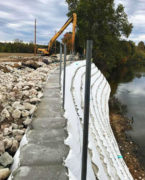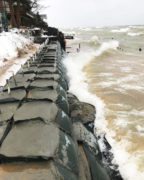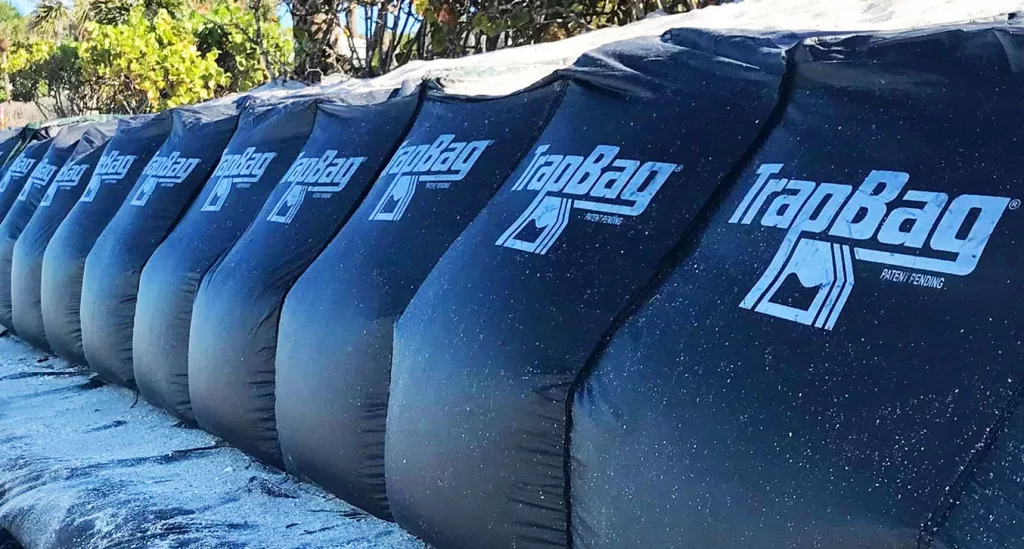Recognizing the plight of thousands of businesses, homeowners, municipalities, organizations and beyond in the face of record water levels on Lake Michigan and the resultant flooding, erosion, and other damage caused by it, a long-time Berrien County contracting family has added a new division to help handle the disastrous results.
Nick Bertuca has launched Midwest Retaining Walls of Coloma, a new division of Bertuca Contractors based in Coloma.
Nick tells me, “I’m starting a new company that is able to provide either a temporary or permanent solution to retention and erosion.” He adds, “The TrapBag system was designed by Everett “Buzz” Waid of Florida and has been used for rapid deployment during disasters.”
So, for instance, during the latest storm surge last Friday ranging from Harbor Country to north of South Haven, Bertuca says, “The TrapBag system could have been deployed in a temporary format and put in place to hold water back by filling the system with sand, however, they can also be used in a permanent fixture by filling them with concrete.”
By way of explanation, Nick says, “The bags accordion out, and are all connected, to create a wall. They can be stacked to make as tall a structure as necessary, even to hold back a bluff from collapse, for example.” Looking at traditional methods currently being employed, Bertuca contends, “RipRap or large armor-stone boulders piled up is the most common fix for big projects, however it is extremely expensive and very labor- and time-consuming.” Additionally, he notes, “Boulders also take a huge staging area and can cause tremendous destruction to that staging area.”
Regarding Midwest Retaining Walls, Bertuca says, “We can use much smaller equipment when installing the TrapBag system. We then pump concrete into the cells creating the boulders in place instead of extensive hauling.” He notes that, better still, the system can even be implemented in the water, it doesn’t need to be on dry land in order to work.
Bertuca says the system has been used all over the nation, and has been tested and used by the U.S. Army Corps of Engineers.
Bertuca says, “When your property is at risk, we can deliver rapid deployment of commercial and residential retaining walls, fighting against erosion and water using the patented TrapBag Systems for fast deployment and tested reliability.”
Midwest Retaining Walls works together with all parties to offer an end-to-end client experience that includes permitting, engineering, and construction services for Great Lakes seawalls and erosion control. He says, “When time is of the essence to save your house from falling down a bluff, or a river from cresting into your neighborhood, TrapBag rapid deployment systems can swing into action to save the day.” He says, “When it comes to speed of installation and project cost, TrapBag can’t be beat.”
For those impacted on smaller, inland lakes, Midwest Retaining has smaller cell systems that work perfect for small lake retaining walls, usually with installation in as short a time span as 48-hours. 
For storm surge protection, Bertuca says, “If a flood is imminent, we can rapidly deploy a TrapBag system in a temporary format, saving both time and valuable infrastructure from damage.
For those who are simply looking for a more normal retaining wall not necessarily related to surging waters, Midwest Retaining also offers traditional block and timber walls, or cement block retaining walls for both business and residential construction.
Their web address, linked below, takes you directly to their site. The phone number is 269-468-5667, which is the same as for Bertuca Contractors as it is a division of that firm which has been in business serving Southwest Michigan since 1972.
Here’s the link: http://www.midwestretainingwalls.com
Here’s a link to more about the TrapBag system itself, from the company headquartered in Ft. Myers, Florida: https://trapbag.com






